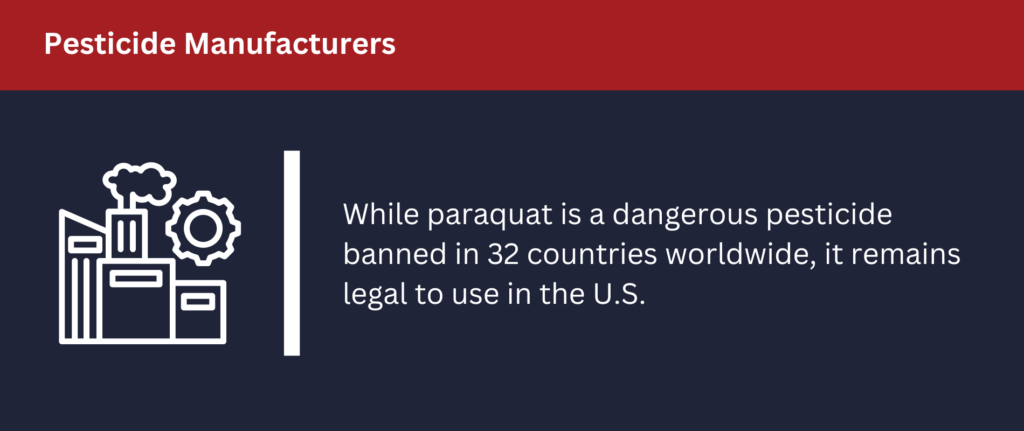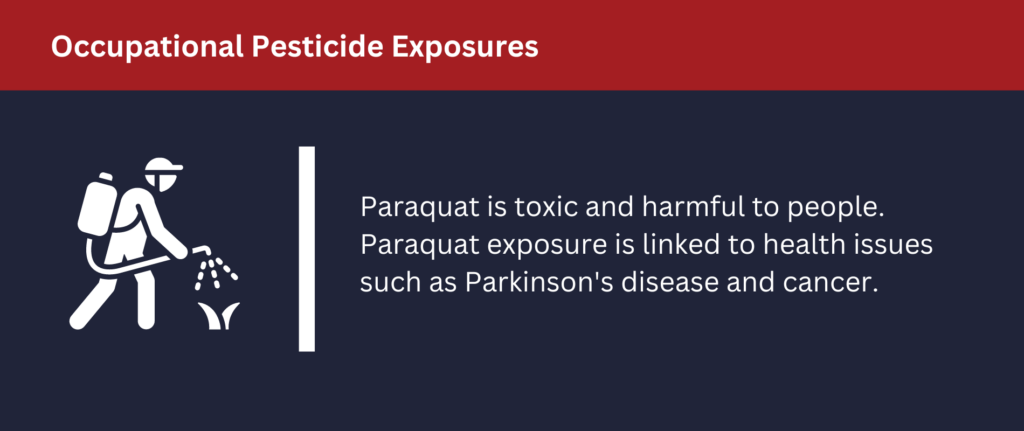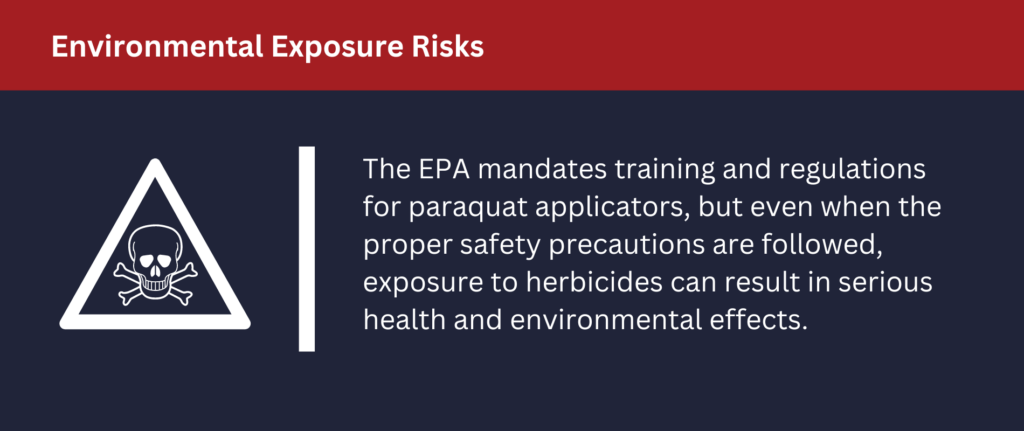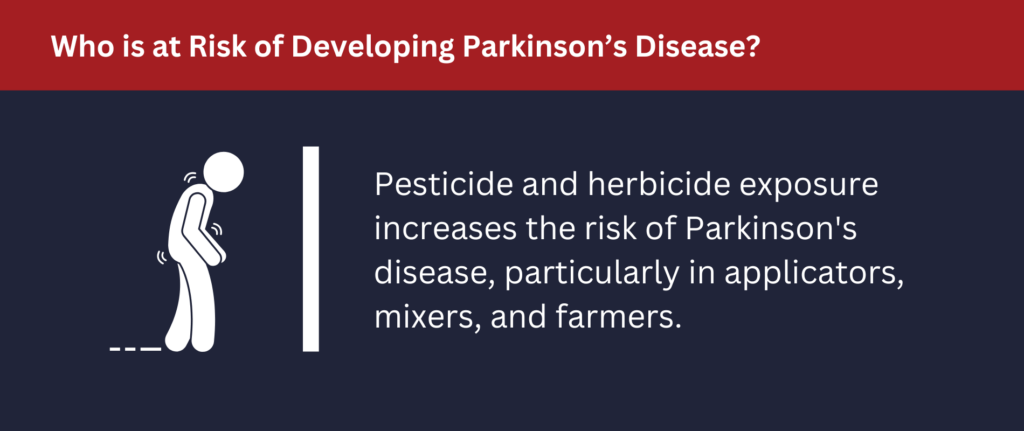There have been many studies concerning pesticides and Parkinson’s disease that have indicated that exposure to the popular commercial weed killer can significantly increase a person’s chances of developing this devastating neurodegenerative disorder. Have you been exposed to pesticides? Have you recently been diagnosed with Parkinson’s disease? If so, you may be eligible to file a California paraquat lawsuit. Contact the attorneys at Nadrich Accident Injury Lawyers today to learn how you can hold the negligent manufacturer of paraquat responsible.
Pesticide Manufacturers

Paraquat is lethal, even in very low doses. The U.S. has registered paraquat as a restricted use pesticide, meaning it can only be used and purchased by certified licensed applicators.
Paraquat was first introduced in 1962. Since then, paraquat products have been sold by Syngenta, Chevron Chemical Company, and other companies under a variety of brands including:
- Para-Shot 3.0
- Devour
- Bonedry
- Helmquat 3SL
- Firestorm
- Cyclone SL 2.0
- Blanco
32 countries have since banned paraquat products due to the unreasonable risk of Parkinson’s disease linked to exposure. However, the use of paraquat products in the U.S. has increased over time, with over 10 million pounds of paraquat used in the country annually.
The Link Between Pesticides and Parkinson’s
While the causes of PD are still unknown, there’s some evidence that shows environmental factors, a family history of Parkinson’s disease, or a combination of the two play a role.
Previous studies have estimated that 10% of PD cases are due to genetic factors, meaning you’re at a higher risk of developing Parkinson’s disease if you have a family history of PD. Additional studies are underway to learn more about the connection between pesticide exposure, duration of exposure, certain lifestyle factors, and the development of Parkinson’s disease.
Occupational pesticide exposures, other sources of pesticide exposure, head trauma, or exposure to heavy metals can also increase a person’s risk of developing neurodegenerative diseases.
Most people don’t have a clear cause of their PD diagnosis. Several years can pass from the time of environmental exposure to the pesticides to the appearance of Parkinson’s disease symptoms, which makes it difficult to establish a link between exposure and a diagnosis.
Who is at Risk of Developing Parkinson’s Disease?
Pesticide and herbicide exposure is considered one of the leading risks of developing Parkinson’s disease, especially when it’s combined with other factors that contribute to the development of the disease.
Over the past several years, many epidemiologic studies have highlighted the link between chemical exposures and Parkinson’s disease. These studies have found that applicators, mixers, farmers and other handlers of the weed killer are much more likely to be diagnosed with PD.
Research has identified the potential mechanism of action that explains the association between pesticide exposure and Parkinson’s disease, indicating that exposure to paraquat increases the production of certain types of oxygen derivatives that can harm cellular structures, making it more likely for someone who has been exposed to paraquat to develop Parkinson’s disease.
A Look at Parkinson’s Disease
Parkinson’s is a neurodegenerative disorder that causes the nerve cells in the brain to die. This results in damage to brain function and impaired movement. Unfortunately, PD is a progressive disease with no cure.
Symptoms of Parkinson’s disease include:
- Slowed movement
- Tremors
- Rigid muscles
- Loss of automatic movements
- Slowed movement
- Changes in speech
- Changes in writing
Symptoms can also include cognitive changes, memory changes, fatigue, insomnia, anxiety, and depression. Other physical side effects can include trouble swallowing, facial masking, drooling, hunched over or stooped appearance, dizziness, loss of smell, pain and other symptoms.
Occupational Pesticide Exposures

Paraquat is one of the most popular herbicides in the U.S. Because of the weed killer’s toxicity levels, it’s only available for commercial agricultural use. This means paraquat can only be used by a licensed paraquat applicator.
Paraquat is commonly used for crop types including sugarcane, potatoes, peanuts, cotton, soy, and corn. Hundreds of acres of crops are doused with this chemical every year.
Studies have shown that exposure to herbicides and different types of pesticides can result in serious injury, including kidney failure, liver failure and heart failure. Ingesting even a small amount of paraquat can result in death.
Epidemiologic studies have proven that exposure to herbicides can significantly increase a person’s risk of developing Parkinson’s disease by 200%.
What is Residential Exposure?
Residential exposure to different types of pesticides is possible if you live near a commercial farm or field where pesticides are used. If you are diagnosed with Parkinson’s disease, your physician will discuss genetic risk factors and exposure history to determine the cause of your PD diagnosis.
Environmental Exposure Risks

To avoid paraquat poisoning, the EPA required all potential paraquat applicators to participate in a training program before they’re allowed to apply, load, or mix the chemical. The training focuses on how to apply and handle the chemical. However, this training requirement doesn’t replace the manufacturer’s obligation to provide adequate warnings regarding the effects of occupational exposure, environmental exposure, and paraquat’s link to Parkinson’s disease.
Additionally, the manufacturer has added a strong odor to the chemical, blue dye to the weed killer, as well as a chemical agent that causes someone who ingests paraquat to vomit.
However, these safety measures and warnings remain ineffective protection against the known side effects of exposure. Even when the proper safety precautions are followed, exposure to herbicides can result in serious health effects.
There are several routes that small amounts of paraquat can enter the body:
- Ingestion of droplets through the nose and mouth
- Inhalation of paraquat through the nose and mouth
- Absorption through the skin or through abrasions
Once the chemical enters the human body, it can result in oxidative stress. Oxidative stress causes the cells to degenerate and die. Oxidative stress is also a major contributing factor to PD. Even low levels of pesticide exposure can mimic cellular changes that are linked to the development of Parkinson’s disease.
Paraquat Lawsuits
Currently, there are several lawsuits against the manufacturers of paraquat. Plaintiffs in paraquat lawsuits are pursuing a product liability claim against both the manufacturers and distributors.
There are many class-action lawsuits being reviewed, as well as individual injury claims against major manufacturers of paraquat, for their failure to warn consumers about the risk of developing Parkinson’s disease due to exposure to this toxic herbicide.
Manufacturers have known about the link between exposure and Parkinson’s disease, as well as the other serious health risks associated with use.
Compensation may be available for people who have been diagnosed with Parkinson’s disease following exposure.
This can include:
- Farmers
- Agricultural workers
- Tank fillers
- Chemical mixers
- Herbicide applicators
- Families that live near fields or farming communities
The impact and cost of a Parkinson’s disease diagnosis can be devastating for individuals and families left with this debilitating and progressive disease.
Paraquat Attorneys
Manufacturers of paraquat have failed to ensure that farmers, licensed applicators and others exposed to the weed killer were adequately warned concerning the risks of exposure. The lawyers at Nadrich Accident Injury Lawyers can help you file a claim against negligent manufacturers, alleging:
- Misrepresenting the safety of paraquat for several decades
- Failure to ensure that farmers, applicators, agricultural workers, and others were adequately warned against the potential side effects of paraquat use
- Failure to warn consumers concerning the risks linked to paraquat
- Failure to ensure that adequate protection was provided to workers against the potential side effects
- Negligently disregarding the potential risks of paraquat
Contact Nadrich Accident Injury Lawyers Today
If you were diagnosed with Parkinson’s disease due to exposure to paraquat, you may be entitled to compensation. Contact Nadrich Accident Injury Lawyers today at 800-718-4658 or text or email to schedule a no-obligation case review, at no cost to you. We can discuss the facts of your case and explore all of your legal options, so you will leave our office knowing what your rights and your legal options are moving forward. Our attorneys will fight tirelessly on your behalf to ensure the negligent manufacturer of paraquat is held accountable for their negligence and the harm they have caused you and your family.


